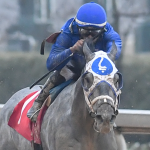
Preakness Quick Sheet: Get to Know the 2021 Preakness Horses

This Monday, legal sports wagering went live at Oaklawn Park in Hot Springs, Ark., making that state the ninth in the country to permit regulated sportsbooks after the U.S. Supreme Court overturned the Professional and Amateur Sports Protection Act last year. Last November, voters in Arkansas approved a constitutional amendment that paved the way for Oaklawn to open up their first-in-the-state sportsbook. General Manager Wayne Smith made the ceremonial first bet on Monday. Naturally, he bet on the Dallas Cowboys, laying 7.5 against the New York Giants on Sept. 8. Cowboy fandom is legion in Arkansas, second only to Arkansas Razorback fandom, since Arkansas has no major professional sports teams of its own.
This occasion is one that is brimming with history and irony. For much of its history, Hot Springs was a town that was built on the gambling business. In addition to Oaklawn, Hot Springs has been home to dozens of brick and mortar casinos and sportsbooks, despite the fact that gambling (other than horse racing) was never legal in Arkansas until last year. Until about 1968, casinos operated in Hot Springs mostly unmolested by law enforcement and with the blessing of elected political leaders at every level of government. The gambling business in Hot Springs was so big, in fact, that it rivaled Las Vegas until the early 1960s, when Teamster loans fueled an incredible building boom on the Las Vegas Strip. Robert Kennedy, as Attorney General in 1962, called Hot Springs the largest illegal gambling operation in America, and vowed to halt it by asking Congress to pass new laws that would give him the power to use the FBI to shut it down. Hot Springs casino owners were too clever for Kennedy, however. They managed to skirt Federal laws by producing their slot machines and gaming equipment within state lines, and only hiring locals to deal their games. So long as nothing ever crossed a state line, the feds couldn’t touch them.

That made things untenable for the bookies of Hot Springs. In addition to the city’s many casinos, there were scores of bookmakers who operated both in storefront handbooks and off of barstools and street corners. They all required access to racing and sporting results in order to process bets in real time. In order to get those results, they all subscribed to a wire service run by one of Hot Springs’s most notorious residents, Owney “The Killer” Madden. Owney was once a top crime boss in New York City. He owned the famed Cotton Club, managed the contracts of fighters like Primo Carnera and Maxie Rosenbloom, dated women like Mae West, and killed anywhere from six to nine people during his violent rise to the top of the rackets. Owney moved to Hot Springs in the early 1930s after finishing a bid in Sing Sing connected to a murder beef. He had been involved in the broad daylight machine-gunning of “Mad Dog” Coll in New York’s Chelsea neighborhood. His friends Frank Costello and Meyer Lansky encouraged him to move to Hot Springs and lay low, maybe look over things in that licentious city.
Eventually, Owney took control of the city’s wire service, which made him a powerful figure in Hot Springs. He charged bookmakers for access, but he also used it to help the powers that be decide who could and couldn’t operate. It was this kind of power that led the mob to take control of the wire service all over the country. They fought a bloody war to wrestle it from the hands of newspaper tycoon Moses Annenberg and his allies. They used the wire to move in on the gambling business from Los Angeles to Las Vegas to Miami and everywhere in between. But after Kennedy convinced Congress to pass laws that would allow them to prosecute for the transmission of gambling information over the wires across state lines, some places folded up shop, including Owney in Hot Springs. Soon after, Owney was called to testify before the Senate rackets committee. He pleaded the fifth to nearly every question he was asked.

After the wire service shut down in Hot Springs, some bookies tried to stay in business. They could take bets and pay off the next day when results were published in the newspaper. Or they’d have employees stationed at racetracks around the country who would call them from payphones and update them on the results. Illegal bookmaking didn’t stop in Hot Springs or anywhere else in America, it just got harder. And it made less money than those salad days when the wire was on and the town was wide open.
Eventually the illegal gambling business in Hot Springs came to pieces. A number of bombings, arsons, and threats of violence turned public opinion around the state, and the election of Winthrop Rockefeller, the first Republican to win the governorship in Arkansas since Reconstruction, spelled doom for the town’s gamblers. Rockefeller sent the state police in to close up shop for good. They rounded up every dice table and slot machine they could find, dragged them in the streets, beat them with sledgehammers, doused them with gasoline, burned them to a crisp, then buried their remains 20 feet underground. Among the twisted, burnt remains one reporter could still make out the words “Made in the Spa City” on one of the slot machines.